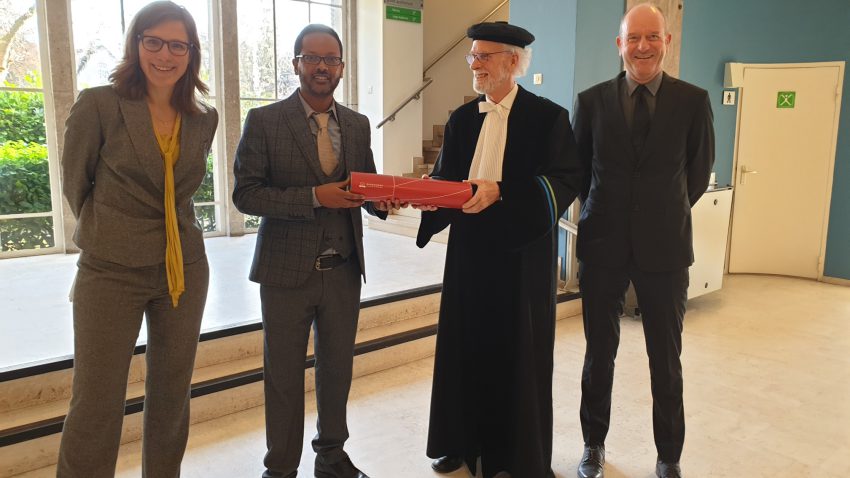Today Yared Demssie successfully defended his dissertation, entitled ‘Identifying and fostering sustainable development competencies. Combining lessons from non-Western and Western contexts’.
Two of the three empirical chapters are published already. These are:
Demssie, Y. N., Wesselink, R., Biemans, H.J.A., & Mulder, M. (2019). Think outside the European box: Identifying sustainability competencies for a base of the pyramid context. Journal of Cleaner Production, 221, 828-838. (Impact Factor: 9.297).
Demssie, Y. N., Biemans, H.J.A., Wesselink, R., & Mulder, M. (2020). Combining indigenous knowledge and modern education to foster sustainability competencies: Towards a set of learning design principles. Sustainability, 12(17), 6823.(Impact factor: 3.251).
The third manuscript is in revision. I have good faith that the third chapter will be published too.
The theme of the dissertation is the identification and development of non-Western competencies on sustainable development. It appeared that many of the competencies which are relevant in Western contexts were also applicable in the non-Western context he studied. But there were various competencies too, which pertained to the non-Western, Ethiopian, context. This appeared to be indigenous knowledge in higher education. With his view Yared is in good company. For, ‘President of the Federal Democratic Republic of Ethiopia, Sahle-Work Zewde, who is also Chair of the International Commission on the Futures of Education recently stated ‘We must ensure that Africa has full access to the collective knowledge resources that humanity has accumulated over generations. And, as important, we must ensure that Africans are able to contribute to, and add, their indigenous wisdom and innovation to the global knowledge commons’. Furthermore, the 2021 Unesco report ‘REIMAGINING OUR FUTURES TOGETHER: A new social contract for education’, says: ‘In general, formal education fails to recognize indigenous knowledge and learning systems and does not respond to the realities and aspirations of indigenous peoples both in rural and urban settings’. And: ‘…the science of pedagogy has … become an expert competence which has often rejected or treated with suspicion informal, indigenous, and not easily accessible knowledges’. And finally: ‘Indigenous knowledge systems raise students’ consciousness that they are part of the natural community, and can draw from the values, practices, and spiritual consciousness that have enabled humanity to live in harmony with the planet for millennia’.
So, in my opinion, a general plea for including indigenous knowledge in education worldwide is not necessary anymore. Now the question becomes: how to do that. The good thing is that Yared’s dissertation went that extra mile. His dissertation specified what the sustainability competencies entail in a non-Western context, which learning design principles are useful in the process of including indigenous knowledge in education, and what authentic learning approaches can be used to foster systems thinking as an essential sustainability competency.
Thanks Yared for a wonderful dissertation. I hope your publications find their way to the interested audience worldwide.
It was a special moment today, as you were my 28th PhD graduate, and the last one in which I acted as Promotor.
Thanks Huub Savelkoul for chairing the session, Sietze Vellema, Marco Rieckmann, Michael Gessler and Paquita Perez, for serving as opponents. Thanks too Renate Wesselink and Harm Biemans for you daily supervision of this project.

